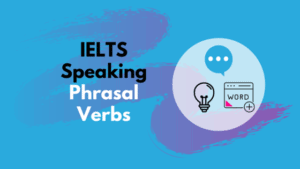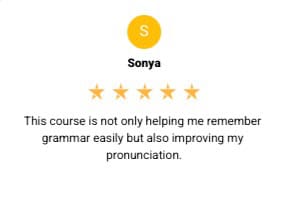How to Start Speaking in IELTS Part 3
👇 Take this lesson with you! 👇
Table of Contents
IELTS Speaking Part 3 is a more free conversation between the candidate and the examiner. It follows the same topic as Part 2, but enters into more depth and your answers need to be longer than in Part 1.
Sometimes students worry that they may not know what to say, what kind of questions they will be asked or how they can develop their answers. Don’t worry in this lesson I will show you how to handle IELTS Speaking Part 3 like a Pro!
IELTS Speaking Part 3: The examiner
Part 3 of the test is critical because this is probably where the examiner will finally decide your score. Typically, they will have placed you between 2 bands at the end of Part 2. Now, it’s their chance to decide whether you are a band 5 or a band 5 or 6, or a band 6 or 7 and so on.
The examiner will really take control of this part of the test in order to push you to your limit; so they are sure about your level.
That’s why they will make up questions based on your answers, and they will cut you off to move on to another question. All of this is normal and fine.
In order to be ready, you should do some research on a wide range of topics, make use of some set phrases that can give you confidence, as well as learn how to develop your answers.
Part 3 Question types and answers
Now, let’s look at some common question types that often appear in Part 3 of the IELTS Speaking test, what the examiner is testing and how you can answer.
1. How has ___ changed in recent years?
Here the examiner is testing if you can make compare the past and present.
To start your answer, you can use phrases like the following;
In the past we used to…
This has changed a lot recently
Now we usually
Previously we used to…
This has changed a lot recently
Nowadays we tend to….
How has shopping changed in recent years?
Previously, we used to go into the town centre and buy things in real shops, brick and mortar shops, but that has changed, and nowadays we still go to the shops but we often buy things online because they are cheaper.

How to develop your answers in IELTS Speaking Part 3
The answer above is nice, but you need to develop your answers more.
You can also try the ORE method
- Opinion
- Reason
- Example
In the example above you can see – I gave my opinion and a reason, now I can add an example. But be careful, try to avoid personal examples, don’t say,
When I buy clothes, I go to the shops to try them on, then I go and buy that item online.
In Part 3 of the test you should avoid personal examples like this. Think more generally and globally. Try something like this;
When many young people buy clothes they go to the shops like GAP to try them on, then they go to the GAP website and buy that item online.
Also think about examples from the News.
I read the other day that one shop, GAP I think, reported that online sales of clothes had actually surpassed in-shop purchases.
More Part 3 question types and answers
2. How will ____ change in the future?
Here the examiner is testing if you can make present and future comparisons.
To start your answer you can use phrases like the following;
At the moment, the situation is ____
I think in the future, we will …..
Right now, the situation is ____
I suspect in the future, we might
Today, it seems to me that…
I guess in the future,we may…
How will shopping change in the future?
At the moment the situation is we buy many clothes online, as well as in shops. I suspect that in the future, we might buy almost everything online.
[+ example]
The other day I saw a new app where you can upload your image and add clothes to it, so you can see if certain clothes or colours suit you. I think this means we will buy more and more clothes online without the need to go to the shop to try them on.
3. Why do some people_____?
Here the examiner is testing your expression of opinion, as well as your ability to speculate and justify your opinions.
My advice here is to focus on one group of people (e.g. teenagers, adults, working people, mothers, retired people…)
To start your answer you could use a phrase like the following;
It depends, if we are talking about [group] then I think…
Why do some people never shop online?
It depends, if we are talking about older people then I think, they may not know how to do it, and they might not trust it.
[+ example]
I have seen a lot of reports in the news of older people being scammed. Buying things online that don’t exist. They might purchase a car because it is super cheap, but then they give the money to the scammers and never see the car.
All of this means they are reluctant to buy online.
How to give yourself time to think
So far, we have seen some very common question types and how to start and develop your answer. However, to do this, you need to think and react quickly.
IELTS Speaking Part 3 can feel very fast. This means that sometimes, you need to create time so you can think. Here are 3 things you can do.
Tip #1: Repeat the question
Listen and repeat the question aloud. This will give you a few seconds. Then take a moment to take a deep breathe and think. After that, give your answer.
Tip #2: Use time fillers
Time fillers are short phrases that don’t really mean anything, but give you a moment to think. Just be careful, don’t overuse them!
That’s a good question
I haven’t thought about this
Let me see
Let me think
Tip #3. Ask the examiner to clarify
If you don’t understand a question, or you did’t hear it, or it wasn’t clear, you can say one of the following,
Could you repeat the question?
Could you say that again?
What do you mean exactly?
But these questions also give you time to think. Just be careful not to overuse them!

Next steps
So, now you have some phrases and techniques, what are you going to do next?
I suggest the following
- Look at some Part 3 topics and subtopics here
- Try and make the three questions above for those topics
- Practice starting your answer using the phrases above
- Think of an example to develop each answer
Remember, the biggest challenge, and most exciting part, of Part 3 is that you can’t really prepare your answers, because you don’t know where the conversation will go.
So topic research is good, but flexibility is more important, and the more you practice, the more flexible you will become.
Improve your Speaking Skills with this Free Course
Crack IELTS Speaking Part 1
Learn to Speak with Confidence in Part 1 of Your IELTS Test!
⭐️⭐️⭐️⭐️⭐️
‘It’s such a great course. I’ve learned so many usages for speaking part 1.’
Zu Htet





